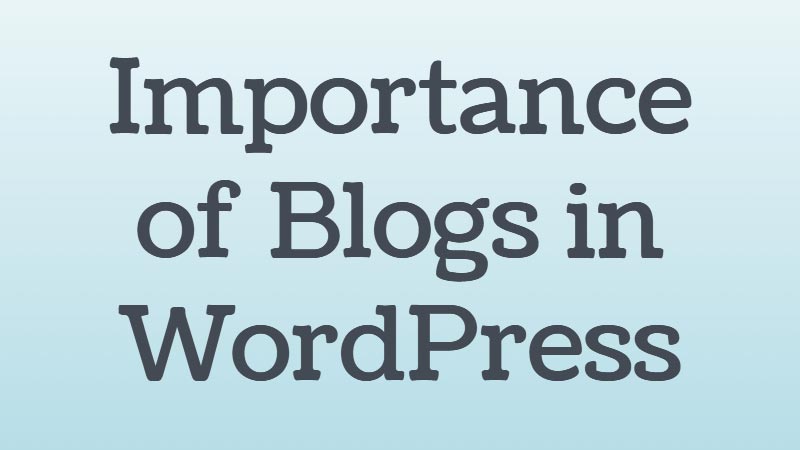Have you ever thought that what is the importance of blogs in WordPress or any website?
Blogs play a significant role in the WordPress ecosystem, serving as a fundamental element of the platform’s success. With WordPress being one of the most popular content management systems (CMS) in the world, blogs have become a primary means of communication and content creation for individuals and businesses alike.
You can create any type of blog if you are using WordPress as a CMS platform. WordPress is a FREE Download CMS and any individual who is new to WordPress can create a website as per his needs.
In this comprehensive analysis, we will explore the importance of blogs in WordPress from various perspectives, including their impact on content marketing, SEO, audience engagement, brand building, and more.
Content Creation and Communication

Blogs are the backbone of content creation in WordPress. They provide a user-friendly interface for authors to publish articles, stories, news, and other forms of written content. Moreover, this allows individuals and organizations to communicate their ideas, expertise, and experiences to a wider audience. WordPress’s intuitive editor and formatting options simplify the process of publishing, making it accessible to people with little technical knowledge.
Let’s delve into the importance of each:
Content Creation
Content is the heart and soul of any blog. It’s what attracts, engages, and retains your audience. Here’s why content creation is essential:
Audience Engagement: High-quality, relevant, and valuable content keeps your readers engaged. Moreover, it helps them find solutions to their problems, learn new things, or simply enjoy reading your posts.
Search Engine Optimization (SEO): Well-structured and optimized content can improve your blog’s visibility on search engines. This means more organic traffic from users searching for topics related to your content.
Establishing Authority: Consistently creating valuable content establishes you as an expert in your field. This authority boosts your credibility and encourages readers to trust your recommendations.
Audience Growth: Engaging content encourages readers to share it with their networks, expanding your blog’s reach and potentially attracting new followers.
Community Building: Through content, you can foster a sense of community around your blog. Encouraging discussions in the comments section or on social media helps build a loyal audience.
Monetization: For those looking to monetize their blogs, quality content is key. It can attract advertisers, sponsors, or customers interested in your products or services.
Communication
Communication is about building a connection with your audience and facilitating interaction. Here’s why effective communication is vital:
Engagement: Engaging with your audience through comments, social media, and email builds a sense of community. Responding to comments and addressing their questions or feedback shows that you value their input.
Feedback Loop: Communication allows you to receive direct feedback from your audience. This feedback can provide insights into what your readers like, what they want more of, and areas where you can improve.
Personalization: By understanding your audience’s preferences, you can tailor your content to their interests. This personalization enhances their experience and makes them feel more connected to your blog.
Trust Building: Responding to comments and interacting with your audience fosters trust. When people see that there’s a real person behind the blog who cares about their opinions, they’re more likely to engage and trust your content.
Content Ideas: Communication with your audience can be a rich source of inspiration for future content. Their questions, comments, and discussions can spark ideas for new blog posts.
Overall, content creation and communication go hand in hand to create a successful WordPress blog. High-quality, valuable content is what attracts and retains readers, while effective communication builds a loyal community and enhances the overall user experience. Hence, balancing both aspects can lead to increased traffic, engagement, and potential monetization opportunities for your blog.
Search Engine Optimization (SEO) Benefits
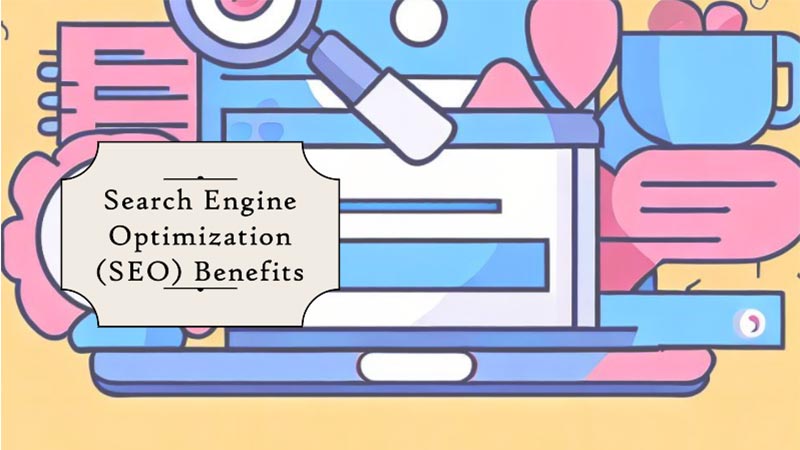
Blogs are a powerful tool for enhancing search engine visibility. Search engines love fresh, relevant content, and blogging enables regular updates to a website. In addition, each blog post can target specific keywords, improving the website’s chances of ranking higher in search engine results pages (SERPs). Furthermore, blogs facilitate the creation of backlinks and inbound traffic, both of which are crucial factors for SEO success.
Here are some key benefits of implementing SEO in your WordPress blog:
Increased Organic Traffic: Proper SEO practices can lead to higher rankings in search engine results pages (SERPs). Higher rankings mean more visibility, which in turn drives organic traffic to your WordPress blog. Additionally, the majority of users click on links within the top search results, so being in those top positions can significantly boost your website’s traffic.
Better User Experience: SEO involves optimizing various aspects of your website, such as site speed, mobile responsiveness, and user-friendly navigation. These improvements not only make search engines happy but also enhance the overall user experience. Besides, a well-structured and easy-to-navigate blog encourages visitors to stay longer, reducing bounce rates and increasing the likelihood of conversions.
Cost-Effective Marketing: Compared to paid advertising, SEO is a cost-effective long-term strategy. While it might take time to see significant results, the efforts you put into optimizing your content can continue to generate organic traffic over an extended period without ongoing ad spending.
Credibility and Trust: Websites that appear high in organic search results are often perceived as more trustworthy and credible by users. Effective SEO can establish your WordPress blog as an authority in your niche, helping to build trust and a loyal readership.
Targeted Traffic: SEO allows you to target specific keywords and phrases relevant to your content and audience. This means the traffic you receive through SEO is highly targeted, as it’s coming from users actively searching for information related to your blog’s topics.
Long-Term Results: Unlike some forms of online marketing that yield short-term results, SEO efforts can provide lasting benefits. Once your content ranks well, it can continue to attract traffic and generate value over time, even if you’re not actively working on new content.
Competitive Edge: In the crowded online space, SEO can give you a competitive advantage. If your blog ranks higher than your competitors for relevant keywords, you’re more likely to attract visitors who might have otherwise ended up on their sites.
Brand Visibility: Improved search engine visibility helps increase your brand’s online presence. As your blog consistently appears in search results, users become more familiar with your brand, which can lead to more direct visits and recognition.
Data-Driven Insights: SEO involves monitoring and analyzing various metrics, such as traffic sources, click-through rates, and keyword performance. This data provides valuable insights into your audience’s behavior and preferences, helping you refine your content strategy.
Adaptability and Evolution: Search engine algorithms are constantly evolving. Engaging in SEO encourages you to stay up-to-date with industry trends and algorithm changes. This adaptability ensures your WordPress blog remains optimized for search engines and user needs.
Implementing effective SEO practices into your WordPress blog can lead to improved online visibility, more targeted traffic, and ultimately, a higher level of success in reaching your goals, whether they involve generating revenue, sharing valuable content, or building a community.
Audience Engagement and Interaction

Blogs promote audience engagement by providing a platform for readers to comment on posts. In addition, this interaction fosters a sense of community around the blog and encourages repeat visits. Above all, WordPress also offers plugins and integrations to enable social sharing, which amplifies the reach of blog content and encourages readers to share posts on their networks.
Here’s why they are so important:
Building a Community: Engaging with your audience helps create a sense of community around your blog. This community can become a loyal and active group of readers who not only consume your content but also interact with each other. Besides, this sense of belonging encourages people to keep coming back and also attracts new visitors.
Increased Traffic: Engaged readers are more likely to share your content on social media, comment on your posts, and link back to your blog from their own websites. Furthermore, these actions can lead to increased organic traffic as your content gets exposed to a wider audience through various channels.
Feedback and Improvement: Interacting with your audience provides you with valuable feedback. Comments, messages, and discussions can give you insights into what your readers like, dislike, or want more of. Additionally, this information can guide you in creating better, more relevant content that resonates with your audience.
Longer Time Spent on Site: Engaging content encourages readers to spend more time on your website. Moreover, if your readers find value in your posts and are engaged in discussions, they are more likely to explore other parts of your blog, read more articles, and discover your offerings.
SEO Benefits: Search engines take user engagement signals into consideration when ranking websites. In addition, pages with longer average time spent on the site, lower bounce rates, and more interactions are often seen as more valuable by search engines, leading to potentially higher search rankings.
Monetization Opportunities: If your blog generates revenue through advertisements, affiliate marketing, or product sales, engaged readers are more likely to click on your ads, purchase recommended products, or become subscribers. An active and engaged audience can increase your overall revenue potential.
Personal Branding: Engaging with your audience allows you to establish a personal connection with your readers. However, this personal connection can help you build your brand and credibility within your niche or industry, making you a trusted source of information.
Ideas and Inspiration: Interaction with your audience can spark new ideas for content. Readers might ask questions, share their experiences, or request specific topics. Overall, these interactions can serve as inspiration for future blog posts, ensuring that you’re creating content that meets your audience’s needs.
Diverse Perspectives: Engaging with your audience can expose you to different viewpoints and perspectives. This can enrich your content by including a wider range of opinions and experiences, making your blog more informative and well-rounded.
Fostering Relationships: Responding to comments and messages helps build relationships with your readers. These relationships can lead to collaborations, guest posting opportunities, and other beneficial connections within your industry.
Integrating various methods of engagement, such as responding to comments, initiating discussions, running polls, hosting giveaways, and encouraging social media sharing, can contribute to a thriving and interactive community around your WordPress blog. Remember that genuine and meaningful engagement is key – focus on building real connections with your audience rather than just chasing metrics.
Building Authority and Credibility

Publishing valuable and informative content through blogs helps establish the author or organization as an authority in their niche or industry. As the blog gains credibility, readers and potential customers are more likely to trust the information presented and the products or services offered. Over time, this can lead to increased brand loyalty and customer retention.
Here’s why they are important:
Audience Trust: People are more likely to engage with and trust content from sources they perceive as authoritative and credible. Establishing yourself as an expert in your niche through well-researched and accurate content helps you build trust with your readers.
Search Engine Ranking: Search engines like Google value authoritative and credible content. Besides, high-quality, reliable content is more likely to rank higher in search results, driving organic traffic to your WordPress blog.
Social Sharing and Backlinks: When your content is considered authoritative, other websites and bloggers are more likely to link to your articles as references. Moreover, this not only brings in referral traffic but also improves your blog’s search engine rankings.
Longevity and Sustainability: Blogs that focus on building authority and credibility tend to have a longer lifespan. However, trends may come and go, but well-researched, insightful, and informative content remains relevant over time.
Niche Domination: Becoming a recognized authority in your niche sets you apart from competitors and positions you as a go-to resource for industry-related information. This can lead to more opportunities for collaboration, partnerships, and speaking engagements.
Engagement and Interaction: An authoritative and credible blog encourages more reader engagement. Visitors are more likely to leave comments, ask questions, and share their experiences when they feel confident in the information you provide.
Monetization Opportunities: Brands and advertisers are more likely to partner with bloggers who have a strong reputation and audience trust. Above all, building authority and credibility can open up opportunities for sponsored content, affiliate marketing, and other monetization strategies.
Personal Branding: Building authority in your niche contributes to your personal branding. As your blog gains credibility, you become recognized as an expert, enhancing your professional reputation within and beyond your blog’s scope.
To establish authority and credibility in your WordPress blog:
Create High-Quality Content: Focus on well-researched, accurate, and insightful content that provides value to your audience.
Cite Sources: Back up your claims with credible sources and references to show that your information is well-grounded.
Consistency: Regularly publish high-quality content to maintain your reputation and keep your audience engaged.
Engage with Your Audience: Respond to comments and engage with your readers to build a sense of community and trust.
Guest Posts and Collaborations: Write guest posts for reputable blogs in your niche and collaborate with other experts to expand your reach and credibility.
Social Proof: Display any relevant credentials, awards, or affiliations on your blog to enhance your credibility.
Transparent About Sponsorships: If you’re monetizing your blog, be transparent about sponsored content and affiliate links to maintain trust with your audience.
Remember, building authority and credibility takes time and consistent effort. Therefore, it’s a gradual process that pays off in the long run by helping your WordPress blog stand out, attract a loyal audience, and achieve your goals.
Content Marketing and Lead Generation
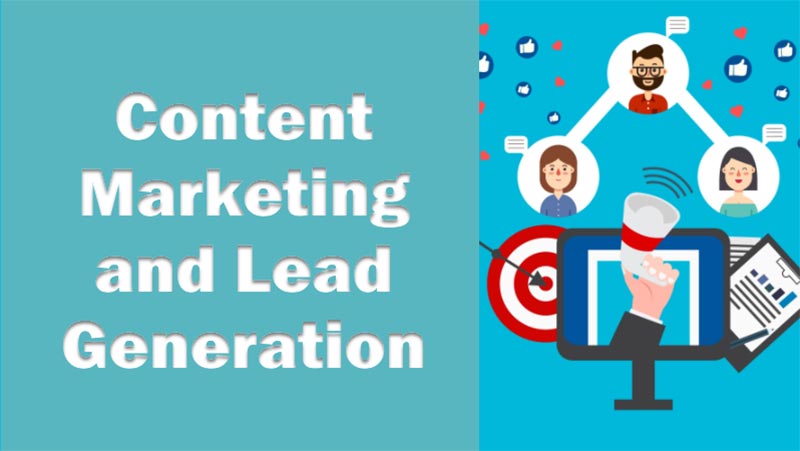
Blogs are a cornerstone of content marketing strategies. By providing valuable content to readers, businesses can attract potential customers and generate leads. Call-to-action (CTA) buttons and lead magnets integrated into blog posts can prompt visitors to subscribe. In addition, you can download resources, or sign up for newsletters, thereby converting them into potential leads for further engagement.
Let’s explore their importance in more detail:
Content Marketing
Content marketing involves creating and distributing valuable, relevant, and consistent content to attract and engage a target audience. In the context of WordPress blogs, content marketing holds several key benefits:
Audience Engagement: High-quality content helps you connect with your readers and keep them coming back for more. It establishes you as an authority in your niche and builds trust.
SEO Benefits: Creating valuable content that answers your audience’s questions can improve your blog’s search engine visibility. Properly optimized content can lead to higher organic traffic.
Brand Awareness: Regular content creation and distribution increase your online visibility, making it easier for people to discover your blog and its offerings.
Social Media Sharing: Engaging content encourages social media sharing, expanding your reach and potentially attracting new readers.
Educational Value: Through informative and educational content, you can help your audience solve problems and learn new things, positioning your blog as a valuable resource.
Lead Generation
Lead generation involves attracting and converting visitors into potential customers or subscribers. For a WordPress blog, lead generation is crucial for building a loyal audience and potentially monetizing your blog. Here’s why it’s necessary:
Building a Subscriber List: Lead generation allows you to collect email addresses or other contact information from interested visitors. Obviously, this creates a direct line of communication with your audience, enabling you to keep them informed about new content, products, or services.
Monetization Opportunities: A well-established subscriber list can become a valuable asset. Similarly, you can promote your products, services, or affiliate offers directly to your subscribers, increasing your revenue potential.
Relationship Building: Lead generation is about more than just collecting email addresses. It’s an opportunity to establish a relationship with your audience, nurture trust, and demonstrate your expertise over time.
Feedback and Insights: Subscribers can provide feedback on your content and offerings, helping you understand their needs better and tailor your content accordingly.
Traffic Stability: Relying solely on organic search traffic can be risky. With a subscriber list, you have a more stable source of traffic that isn’t solely dependent on search engine algorithms.
Combining Content Marketing and Lead Generation in WordPress Blogs
Integrating these two strategies can lead to a powerful synergy. By creating high-quality, valuable content, you can attract more visitors to your blog. Similarly, within your content, strategically place calls-to-action (CTAs) that encourage readers to subscribe, download a resource, or take another desired action. Obviously, this way, you’re not only providing value but also capturing leads for future engagement.
Consider offering lead magnets such as ebooks, guides, or exclusive content in exchange for email subscriptions. Use plugins and tools available for WordPress to set up pop-ups, forms, and landing pages dedicated to lead generation.
Above all, the key is to balance the value you provide through your content with the benefits your audience receives from subscribing. A well-executed content marketing and lead generation strategy can contribute significantly to the growth and success of your WordPress blog.
Community Building and Networking
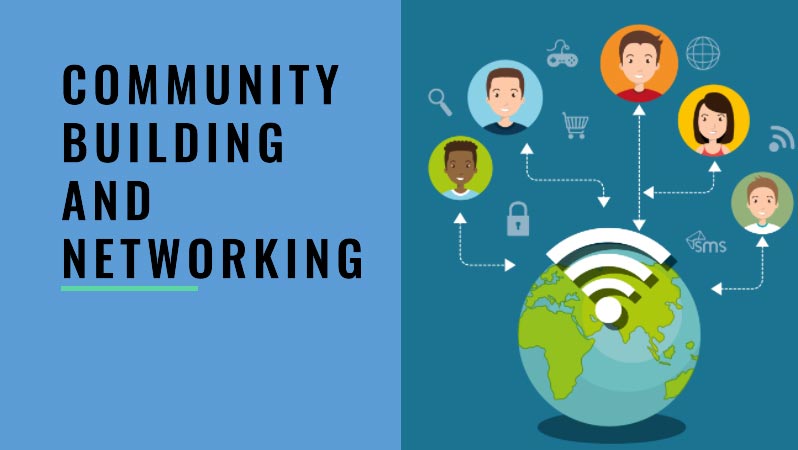
Blogs with an active and engaged readership often foster a sense of community. This community can lead to networking opportunities, partnerships, and collaborations with other bloggers, businesses, or industry influencers. Such relationships can expand the blog’s reach and open up new avenues for growth and exposure.
Here’s why community building and networking are essential for WordPress blogs:
Audience Engagement: Building a community around your WordPress blog allows you to engage with your audience more effectively. Interaction through comments, discussions, and sharing of ideas can lead to deeper connections with your readers, making them more likely to return to your blog regularly.
User-Generated Content: A strong community can contribute user-generated content, such as comments, guest posts, or even content ideas. This not only eases your content creation process but also shows that your blog is a platform for open dialogue and collaboration.
Increased Traffic: Engaged community members are more likely to share your blog posts, which can lead to increased traffic through social media shares, backlinks from other blogs, and word-of-mouth recommendations.
Credibility and Authority: An active and engaged community can establish your blog as an authority in your niche. Besides, when people see discussions and interactions happening on your blog, it lends credibility to your expertise and the quality of your content.
Feedback and Improvement: Community members can provide valuable feedback on your content, design, and user experience. This feedback can help you identify areas for improvement and adjust your approach based on the preferences and needs of your audience.
Networking Opportunities: Building a community can lead to networking opportunities with other bloggers, industry experts, and potential collaborators. Moreover, this can open doors to guest posting, partnerships, and joint projects, expanding your blog’s reach.
Long-Term Relationships: A strong community fosters long-term relationships with your readers. Over time, these relationships can transform into brand loyalty, with community members becoming your most dedicated and supportive followers.
Diversification of Content: Community discussions and interactions can spark new content ideas and perspectives that you might not have considered on your own. This diversification keeps your blog fresh and relevant.
Monetization Opportunities: A well-established and engaged community provides a target audience for potential monetization strategies, such as sponsored content, affiliate marketing, online courses, or products.
Emotional Connection: Building a community creates a sense of belonging and emotional connection among your readers. In addition, this can lead to a more enjoyable and fulfilling experience for both you as a blogger and your audience.
To effectively build a community and network for your WordPress blog:
- Encourage discussions in the comments section of your blog posts.
- Use social media platforms to share your content and engage with followers.
- Host webinars, Q&A sessions, or online events related to your niche.
- Collaborate with other bloggers or experts through guest posts or interviews.
- Implement a user-friendly and interactive design on your blog.
- Respond promptly to comments and messages to show your engagement.
- Consider creating a forum or online community space for deeper discussions.
Finally, community building is a long-term effort that requires consistent dedication and genuine interactions. Overall, the relationships you cultivate within your community can be invaluable for the growth and success of your WordPress blog.
Monetization Possibilities
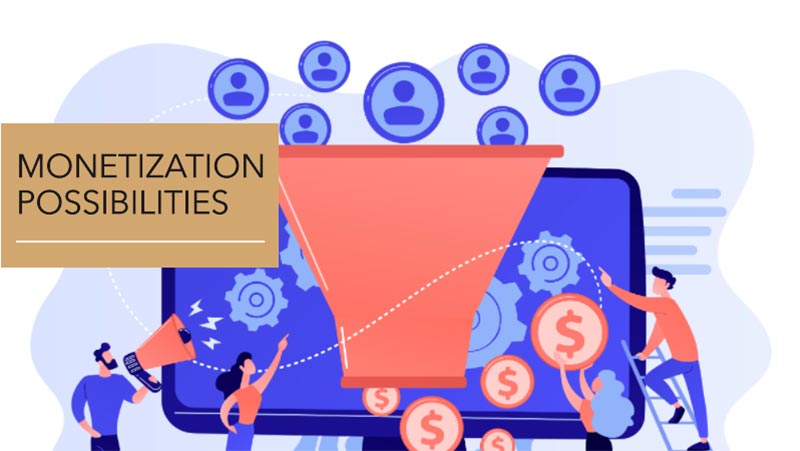
For many bloggers and businesses, WordPress blogs offer various monetization options. These may include display advertising, sponsored content, affiliate marketing, selling digital products, or offering premium content through subscriptions. Successful blogs can generate substantial income streams, making them a viable business model for individuals and organizations.
Here’s why monetization possibilities are important for WordPress blogs:
Financial Reward: Monetization allows bloggers to turn their passion into a source of income. Above all, this is particularly important for those who invest a significant amount of time and effort into creating high-quality content. Whether it’s a side gig or a full-time pursuit, monetization can provide financial stability and motivation to continue producing valuable content.
Sustainability: Blogs require ongoing maintenance, content creation, and website management. Monetization helps cover the costs associated with hosting, domain registration, design, and other expenses. This sustainability ensures that the blog can continue to exist and thrive over the long term.
Incentive for Quality: When bloggers have the potential to earn money from their content, they are often more motivated to produce high-quality, valuable, and engaging posts. Monetization can encourage bloggers to invest time in research, writing, and presentation, resulting in a better experience for their audience.
Diversification of Income: Monetization provides the opportunity to diversify income streams. Instead of relying solely on one source of income, such as ads or affiliate marketing, bloggers can explore multiple options, reducing the risk associated with dependence on a single revenue source.
Professional Growth: As bloggers learn about various monetization methods, they also develop valuable skills in digital marketing, SEO (Search Engine Optimization), social media promotion, and more. Besides, these skills can be transferable to other areas of online business and personal growth.
Variety of Monetization Methods: WordPress blogs offer a wide array of monetization possibilities, including:
- Display Advertising: Integrating ad networks like Google AdSense to display relevant ads on the blog.
- Affiliate Marketing: Promoting products or services and earning a commission for every sale made through referral links.
- Sponsored Content: Collaborating with brands to create content that promotes their products or services.
- Selling Digital Products: Creating and selling e-books, courses, templates, plugins, or other digital products.
- Membership Sites: Offering premium content to subscribers who pay a fee to access exclusive material.
- Donations: Allowing readers to contribute funds to support the blog through platforms like Patreon.
- Selling Physical Products: If relevant, selling merchandise related to the blog’s niche.
Flexibility and Control: WordPress’s open-source nature allows bloggers to customize their monetization strategy according to their goals and audience. They can experiment with different methods, analyze the results, and adapt their approach over time.
Community Support: A successful blog can build a loyal community of readers who appreciate the content. Monetization enables the bloggers to invest more time and resources into serving this community and creating content that resonates with them.
In conclusion, monetization possibilities are essential for WordPress blogs as they provide financial rewards, sustainability, and opportunities for professional growth. By leveraging various monetization methods, bloggers can turn their passion into a sustainable and rewarding online venture.
Flexibility and Customization
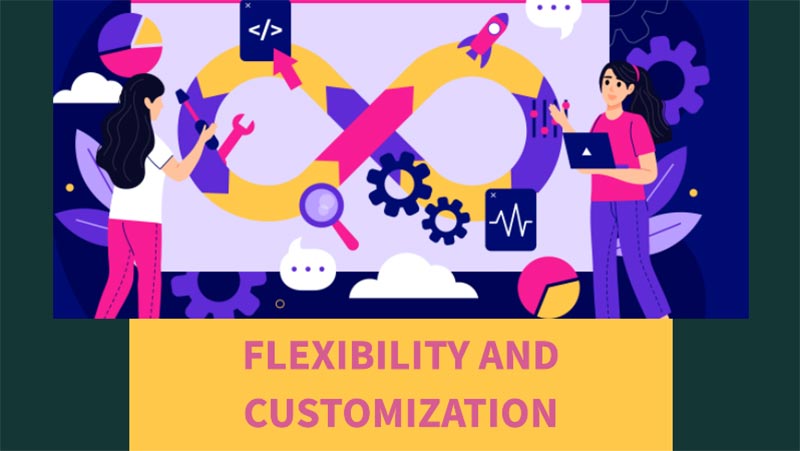
WordPress’s open-source nature and extensive plugin ecosystem allow bloggers to customize and expand their websites according to their needs. Similarly, the flexibility of WordPress enables bloggers to create unique and visually appealing designs, improving the overall user experience and brand representation.
Let’s delve into the importance of flexibility and customization in WordPress:
Adaptability to Diverse Needs: WordPress is used to build various types of websites, from simple blogs to complex e-commerce stores and corporate websites. Its flexibility allows it to adapt to the diverse needs of different industries and niches. Moreover, the ability to customize themes, templates, and plugins ensures that the website can be tailored to meet specific requirements, branding, and functionalities.
Unique Branding and Design: In a highly competitive online landscape, having a unique and visually appealing website is essential to stand out. WordPress’s customization options enable users to create and modify themes to match their brand identity. This helps in establishing a consistent and memorable online presence.
Tailored Functionality: The availability of plugins and the ability to customize them or even develop custom plugins from scratch ensures that websites can have the exact features and functionalities they need. Whether it’s adding e-commerce capabilities, booking systems, membership sites, or any other specific functionality, WordPress can accommodate it.
User Experience Optimization: Flexibility and customization contribute to creating a better user experience. Furthermore, websites can be optimized for speed, mobile responsiveness, and user-friendliness, enhancing visitor engagement and reducing bounce rates.
Scalability and Future Growth: As businesses and websites grow, their needs might change. WordPress’s flexibility allows for scalability, enabling websites to evolve with the changing requirements. Customization ensures that new features can be seamlessly integrated as the website’s scope expands.
SEO and Search Visibility: Search engine optimization (SEO) is crucial for a website’s visibility. Obviously, customizing elements like meta tags, URLs, and content structure helps improve SEO rankings. Additionally, the flexibility to install SEO-focused plugins provides tools for optimizing content and improving search visibility.
Enhanced Security: While customization can introduce security challenges if not done correctly, it also enables site owners to implement security measures tailored to their needs. Custom security plugins, code reviews, and other security practices can be implemented to safeguard the website.
Content Presentation and Layout: Content is king and the way it’s presented matters. Particularly, WordPress’s flexibility allows for granular control over how content is displayed, from arranging layout elements to choosing typography and color schemes. This ensures a consistent and visually pleasing content presentation.
Innovation and Uniqueness: Customization fosters innovation. Developers can experiment with new features and functionalities, pushing the boundaries of what a WordPress site can achieve. This results in unique websites that cater to specific needs and deliver exceptional user experiences.
Cost-Effectiveness: Customizing and extending WordPress often costs less compared to building a website from scratch. Leveraging the existing infrastructure of themes, plugins, and a supportive community reduces development time and costs.
Finally, flexibility and customization are pivotal to WordPress’s success as a versatile CMS. They empower users to create websites that align perfectly with their goals, needs, and branding, while also enabling developers to push the boundaries of what’s possible in website design and functionality.
Educational and Informative Resource

Blogs serve as educational resources, offering valuable information, tutorials, and insights on various topics. They can help readers learn new skills, stay updated with industry trends, and solve problems. As a result, blogs contribute to the overall knowledge-sharing culture on the internet.
Here’s why they are important:
Learning and Knowledge Dissemination: Educational blogs offer a platform for experts, educators, and enthusiasts to share their expertise, insights, and knowledge. They can cover a wide range of topics, from academic subjects to practical skills, making learning accessible to a global audience.
Accessible Learning: Blogs are easily accessible to anyone with an internet connection. Similarly, this democratizes education and allows people from various backgrounds, including those who might not have access to formal education, to learn and grow.
Diverse Content Formats: Blogs can include various types of content, such as articles, videos, infographics, and podcasts. Therefore, this variety caters to different learning styles and preferences, making it more engaging for a broader audience.
Continual Learning: Educational blogs offer a way for individuals to engage in lifelong learning. Moreover, readers can keep up with new developments, trends, and research in their fields of interest.
Supplementary Learning: They can complement formal education by providing additional explanations, examples, and practical applications that might not be covered in traditional classrooms.
Global Reach: Online blogs have a global reach, allowing people from different parts of the world to access the same information. Nevertheless, this fosters cross-cultural understanding and sharing of ideas.
Interactive Community: Many educational blogs encourage interaction through comments and discussions. Furthermore, readers can ask questions, share their experiences, and engage in meaningful conversations, creating a sense of community and collaborative learning.
Stay Updated: Informative blogs keep readers informed about the latest news, trends, and developments in various fields. Besides, this is especially important in rapidly changing industries such as technology and healthcare.
Expert Insights: Blogs often feature content from experts and practitioners in their respective fields. Since this provides readers with insights and perspectives from those who have real-world experience.
Career Enhancement: Informative blogs can help individuals acquire new skills or deepen their existing knowledge, potentially leading to career advancement and improved job opportunities.
Research and References: Blogs can serve as valuable resources for research and references, especially for topics that might not have extensive coverage in traditional academic sources.
Empowerment: Educational and informative blogs empower individuals to take control of their learning journey. Particularly, readers can choose what topics to explore when to learn, and at what pace.
Cost-Effective: Many educational blogs offer content for free, reducing the financial barrier to accessing valuable information and learning resources.
Flexibility: Viewers can access educational blogs at their convenience, allowing for flexible learning schedules that fit into busy lifestyles.
To summarize, educational and informative resources WordPress blogs have a significant impact on education, learning, and knowledge sharing. They provide a versatile and accessible platform for individuals to expand their horizons, acquire new skills, and engage with a global community of learners and experts.
Global Reach and Accessibility

The internet has made information accessible to a global audience, and blogs are no exception. Above all, WordPress blogs can reach people from different countries and cultures, breaking down geographical barriers and creating connections across the world.
Let’s explore the importance of these factors in more detail:
Global Reach
Global reach refers to the ability of your WordPress blog to reach and engage with an international audience. This is important for several reasons:
Diverse Audience: By making your blog accessible to people from different countries, cultures, and backgrounds, you can tap into a diverse audience that brings various perspectives and experiences to your content.
Wider Impact: A global reach means your blog can have a broader impact and potentially influence a larger number of people across the world. This can be particularly beneficial if you’re sharing valuable information, promoting a cause, or trying to build a brand.
Business Opportunities: If your blog is related to a business or e-commerce, having a global reach can open up new markets and opportunities for growth. Moreover, you can attract customers, clients, or collaborators from various parts of the world.
Accessibility
Accessibility refers to the design and development of your WordPress blog to ensure that people with disabilities can use and interact with your content effectively. Secondly, this is not only an ethical consideration but also a legal requirement in many regions. Here’s why accessibility matters:
Inclusive Experience: An accessible blog ensures that individuals with disabilities, such as visual, auditory, motor, or cognitive impairments, can easily access and understand your content. This inclusivity reflects positively on your brand and values.
Legal Compliance: Many countries have laws that require websites to be accessible to people with disabilities. Failing to comply with these regulations could lead to legal consequences and damage to your reputation.
Better SEO: Implementing accessibility practices often improves the overall structure and quality of your website, which can have a positive impact on your search engine rankings. Search engines value websites that are user-friendly and well-organized.
Enhanced Usability: Accessibility features, such as clear navigation, descriptive images, and properly formatted content, benefit all users, not just those with disabilities. A well-structured and easy-to-navigate blog is more likely to keep visitors engaged.
To achieve a global reach and ensure accessibility in your WordPress blog, consider the following steps:
- Multilingual Content: Use plugins or themes that allow you to translate your content into different languages, enabling international users to understand your posts.
- Responsive Design: Ensure your blog is responsive and displays properly on various devices, including smartphones and tablets.
- Alt Text for Images: Provide descriptive alt text for images to make your content accessible to visually impaired users who rely on screen readers.
- Readable Fonts and Colors: Choose legible fonts and color combinations that are easy to read for users with visual impairments.
- Keyboard Navigation: Ensure all interactive elements can be navigated and activated using a keyboard, catering to users who cannot use a mouse.
- Captioned Media: Provide captions or transcripts for videos and audio content, benefiting users who are deaf or hard of hearing.
- Semantic HTML: Use proper HTML tags to structure your content, which helps screen readers interpret and present the content accurately.
In a nutshell, by paying attention to both global reach and accessibility, you create a more inclusive, impactful, and user-friendly WordPress blog that can resonate with a wider audience and make a positive difference in the online world.
Feedback and Improvement
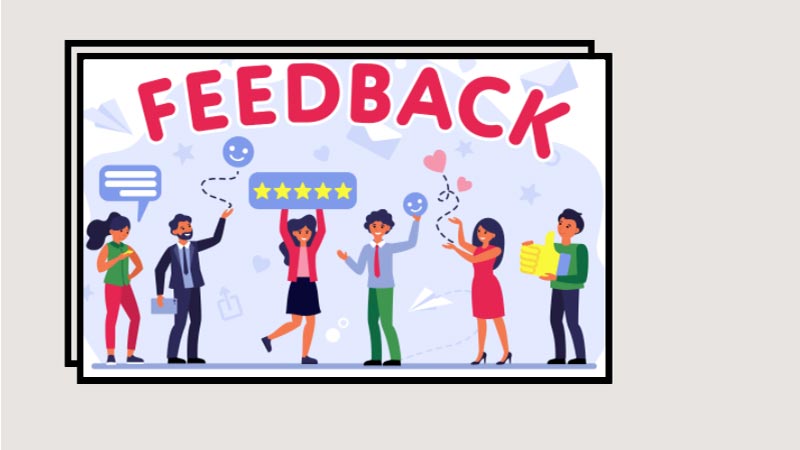
Blogs provide a platform for receiving feedback from readers, customers, or clients. However, this feedback is invaluable for making improvements, understanding the audience’s needs, and tailoring future content accordingly. It enables a continuous cycle of learning and enhancement.
They contribute to the growth, engagement, and overall quality of your blog. Here’s why they are important:
User Engagement: Feedback allows your readers to engage with your content by sharing their thoughts, suggestions, and questions. In addition to that, this engagement creates a sense of community and encourages readers to return for more discussions and interactions.
Understanding Audience: Feedback helps you understand your audience better. Through comments, emails, and social media interactions, you can learn about your readers’ preferences, interests, and needs. This information is valuable for tailoring your content to suit your audience’s expectations.
Quality Enhancement: Constructive feedback can point out areas for improvement in your content, writing style, website design, and user experience. Obviously, this information enables you to refine your content, fix errors, and provide a better user experience.
SEO and Content Optimization: Feedback can uncover the keywords, topics, and ideas that your readers are searching for. Basically, this information can guide your content creation strategy and improve your website’s search engine optimization (SEO), driving more organic traffic to your blog.
Building Relationships: Responding to comments and feedback personally shows your readers that you value their input and are open to conversation. As a matter of fact, this builds a stronger bond between you and your audience, enhancing their loyalty and trust.
Ideas for Future Content: Reader feedback can serve as a source of inspiration for future blog posts. As can be noted, addressing the questions and concerns raised by your readers allows you to create content that directly caters to their interests.
Identifying Technical Issues: Feedback might highlight technical issues, such as broken links, formatting problems, or slow loading times. Although, addressing these issues ensures a smooth browsing experience for your readers.
Continuous Improvement: Regularly seeking and acting upon feedback encourages a culture of continuous improvement. Evidently, this mindset can lead to consistent growth in both the quality of your content and the size of your readership.
Validation and Encouragement: Positive feedback and compliments from readers can boost your motivation and self-esteem. Knowing that your content is making a positive impact on people’s lives can be incredibly rewarding.
To make the most of feedback and facilitate improvement in your WordPress blog, consider the following practices:
- Encourage Comments: Make it easy for readers to leave comments by using user-friendly commenting systems. Respond to comments promptly to foster meaningful discussions.
- Feedback Channels: Provide multiple channels for feedback, such as contact forms, surveys, and social media platforms.
- Act on Feedback: Act on valuable feedback by making necessary improvements to your content, design, or user experience.
- Regularly Review Analytics: Regularly analyze website analytics to understand user behavior and adjust your content strategy accordingly.
- A/B Testing: Experiment with different layouts, headlines, and content formats to determine what resonates best with your audience.
- Stay Updated: Keep up with the latest trends in content creation, SEO, and user experience design to ensure your blog remains relevant and engaging.
Incorporating feedback and actively seeking ways to improve your WordPress blog can lead to increased traffic, higher reader engagement, and a stronger online presence.
Expression of Creativity and Passion

Blogs allow individuals to express their creativity, passions, and unique perspectives. Whether it’s through writing, photography, art, or multimedia, bloggers can showcase their talents and connect with like-minded individuals who share similar interests.
Here’s how WordPress blogs serve as expressions of creativity and passion:
Personal Branding: WordPress blogs provide a space for individuals to create a personal brand. They can customize the design, layout, and overall aesthetic of their blogs to reflect their unique style and personality. This customization allows bloggers to showcase their creativity and create a memorable online presence.
Content Creation: Bloggers can write about topics they’re passionate about, whether it’s fashion, travel, cooking, technology, or any other subject. This allows them to dive deep into their interests, research extensively, and present their findings and opinions in a creative and engaging manner.
Visual Expression: Many bloggers use WordPress to share their photography, illustrations, and other visual arts. They can use the platform to showcase their portfolios and display their artistic skills to a wider audience.
Creative Writing: WordPress blogs are a great platform for aspiring writers to share their stories, poems, essays, and more. Writers can experiment with different writing styles and genres, using their blogs as a canvas for literary expression.
Community Engagement: Blogging on WordPress fosters interaction and engagement with readers through comments and social media sharing. This interaction allows bloggers to connect with like-minded individuals, receive feedback, and build a community around their passion.
Learning and Sharing: Passionate individuals often use WordPress blogs to document their learning journeys. Whether it’s a DIY project, a new skill they’re acquiring, or a new hobby, sharing these experiences can inspire others and foster a sense of accomplishment.
Advocacy and Awareness: Many bloggers use their platforms to raise awareness about important social issues, share their opinions, and advocate for positive change. This allows them to use their creativity and passion to contribute to meaningful discussions.
Inspiration and Motivation: By sharing their experiences, challenges, and successes, bloggers can inspire and motivate their readers. People often connect with authentic stories of others who are pursuing their passions, which can encourage them to do the same.
Building a Portfolio: For creative professionals like designers, writers, photographers, and artists, a WordPress blog can serve as a portfolio that showcases their work to potential clients, collaborators, and employers.
Ongoing Growth: Blogging provides an opportunity for continual growth and improvement. As bloggers receive feedback and engage with their audience, they refine their skills and develop new ones, all while staying true to their passions.
Are blogs necessary for all websites?

Blogs are not necessary for all websites, but they can be beneficial for many different types of websites. Whether or not a website should have a blog depends on its purpose, goals, and target audience. Here are some points to consider when deciding whether a blog is necessary for a website:
Content Marketing: Blogs are an excellent platform for content marketing. If your website aims to attract and engage visitors through informative and valuable content, a blog can be a powerful tool to achieve that.
SEO Benefits: Blogs can help improve a website’s search engine optimization (SEO) by providing fresh and relevant content. Search engines tend to favor websites that regularly update their content, which can lead to higher rankings in search results.
Showcasing Expertise: Blogs allow individuals or businesses to demonstrate their expertise in their industry or niche. By sharing insightful articles and valuable information, you can build credibility and authority among your audience.
Engaging with Visitors: Blogs provide a platform for interaction with your audience through comments and social media sharing. This engagement can foster a sense of community around your website.
Driving Traffic: A well-maintained and optimized blog can drive additional traffic to your website. Eventually, visitors may find your blog posts through search engines, social media, or referrals from other sites.
Keeping Content Fresh: For websites with static pages, like a business website or portfolio, a blog can help keep the website content fresh and current. This can encourage visitors to return to the site regularly.
Announcements and Updates: Blogs can serve as a place to announce new products, services, or company updates. This can be particularly useful for businesses or organizations.
On the other hand, some websites may not find much value in having a blog. For example:
Minimal Content Needs: If your website serves a straightforward purpose and requires only a few static pages to convey its message, a blog might not be necessary.
Limited Resources: Maintaining a blog can be time-consuming, requiring effort in content creation, promotion, and engagement. Additionally, if you lack the resources to manage a blog effectively, it may not be worthwhile.
Different Content Strategy: Some websites might opt for other content formats like videos, podcasts, or interactive tools. In such cases, a blog might not align with the chosen content strategy.
Conclusion
To conclude, blogs are a critical component of WordPress, playing an essential role in content creation, SEO, audience engagement, brand building, and more. With their vast potential for networking, monetization, and global reach, blogs empower individuals and businesses to make their mark on the digital landscape. Furthermore, as WordPress continues to evolve and improve, blogs will remain a central force in shaping the online world.
In addition, blogs can be a valuable addition to many websites, but they are not universally required. Consider your website’s goals, content strategy, and available resources to determine whether a blog aligns with your overall objectives. If done well, a blog can be a powerful asset for your online presence. But it’s essential to weigh the pros and cons based on your specific situation.
Now over to you,
Are you adding blog posts to your WordPress website?
Do you think the importance of blogs on WordPress sites?
Please let us know your thoughts and join us on Facebook and Twitter.
